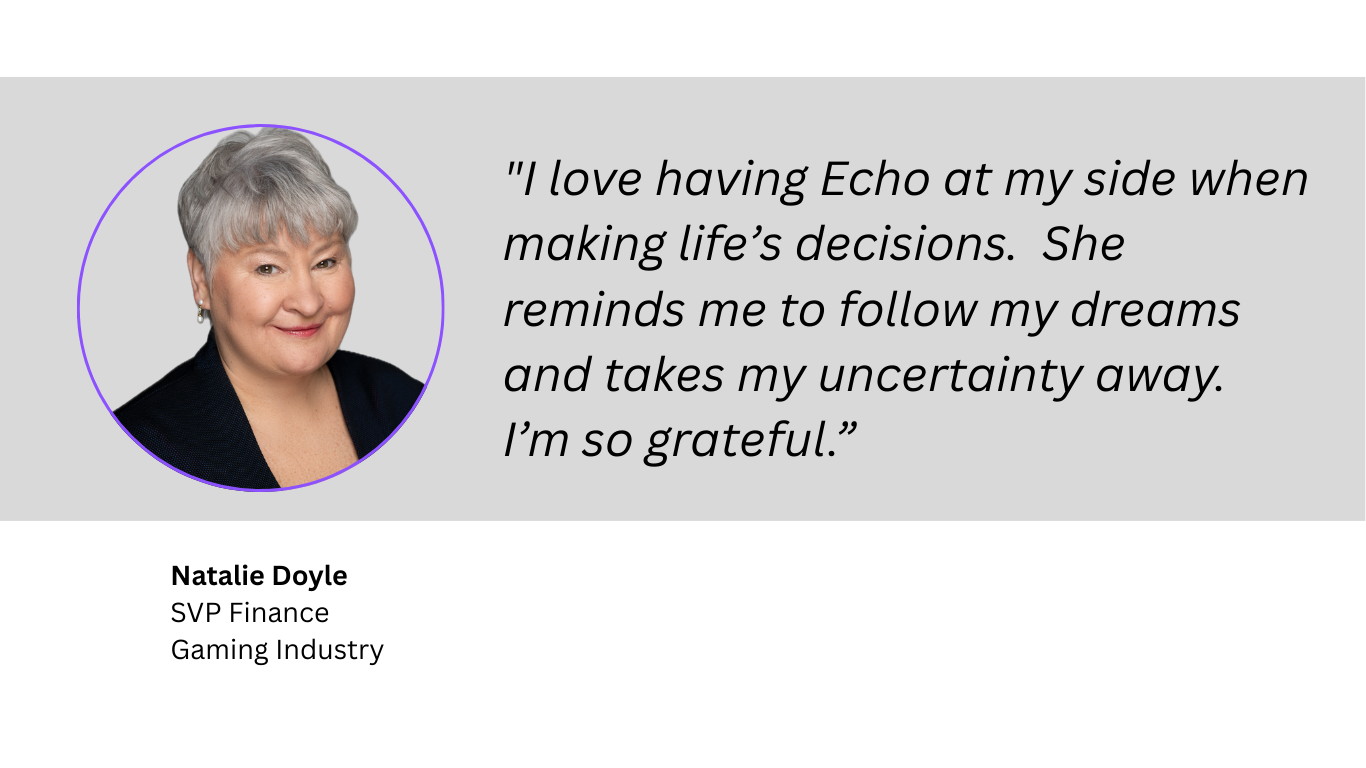Our Clients
A Partnership for Life’s Financial Journey
We work with individuals and families who understand that building and sustaining wealth requires thoughtful planning and ongoing guidance. Whether you're navigating career transitions, preparing for retirement, or planning your legacy, we’re here to help you make purposeful decisions with your wealth—so you can live fully today and confidently shape tomorrow.

Planning for Executives
Executive compensation brings unique challenges—from stock options and restricted stock to pensions and deferred comp.
We help you navigate these complexities and unlock the full value of your benefits. With extensive experience and dedicated resources, we deliver tailored financial planning solutions that support your goals and simplify decision-making.

Planning for Women
Women often face distinct financial challenges—longer lifespans, wage gaps, and career breaks for caregiving.
We support women through key transitions like divorce or loss of a partner by providing thoughtful guidance and personalized strategies. Our goal is to empower confident decision-making at every stage of life.

Planning for Entrepreneurs
Building a business takes vision and drive—so does planning for what comes next.
We help entrepreneurs align their business and personal goals through smart strategies for cash flow, tax efficiency, compensation, risk management, and exit planning. It’s about turning today’s momentum into lasting financial strength.
Read our Blog
- Alternative Strategies That Work: Helping Investors Navigate Uncertainty
- From Plan to Action: How Echo Wealth Management Bridges Strategy and Execution
- Strategic Implications of the 2026 Roth Catch-Up Rule for High Earners
- Smart Strategies to Maximize OBBBA Benefits in 2025
- The OBBBA and Minnesota Estate Tax: What High-Net-Worth Families Should Know
- Year-end Checklist for Insurance
- Get to Know Jared Johnson: Turning Financial Complexity into Clarity
- Staying Secure in a Digital World: Cybersecurity Resources from Schwab and Practical Steps to Protect Your Identity
-
Alternative Strategies That Work: Helping Investors Navigate Uncertainty
"The investment landscape has changed dramatically, and new strategies are constantly emerging," says Jared Johnson, CFP®, Wealth Manager and Shareholder at Echo Wealth Management. "Our role is to thoughtfully integrate innovative solutions that strengthen portfolios while staying aligned with each client’s long-term plan."
-
From Plan to Action: How Echo Wealth Management Bridges Strategy and Execution
"A financial plan is only as good as its execution," says Jared Johnson, CFP®, Wealth Manager and Shareholder at Echo Wealth Management. "My role is to make sure great strategy turns into real-world outcomes."
With nearly eight years at Echo Wealth Management, Jared sits at the intersection of financial planning and investment execution. As a shareholder and a key steward of portfolio implementation, he helps ensure that every investment decision reflects not just market conditions, but each client’s broader goals, tax considerations, and long-term vision.
At Echo, execution isn’t an afterthought—it’s a core part of delivering confidence and clarity to clients.
-
Strategic Implications of the 2026 Roth Catch-Up Rule for High Earners
By Jared Johnson, CFP®
Shareholder, Wealth ManagerStarting in 2026, high-income earners face a significant shift in how catch-up contributions to retirement plans must be structured. Under final regulations issued by the IRS in response to the SECURE 2.0 Act, individuals age 50 and older earning more than $145,000 in prior-year wages will be required to make all catch-up contributions on a Roth basis—post-tax dollars only.
This is more than a procedural change. For affluent individuals navigating complex financial lives, this rule introduces nuanced implications across tax strategy, liquidity planning, and intergenerational wealth design.
The Rule—In Brief
Effective January 1, 2026, employees earning over $145,000 (W-2 wages only) in the previous year will no longer be permitted to make pre-tax catch-up contributions to their employer-sponsored retirement plan. If the plan allows catch-ups, and if the individual qualifies based on age, those additional contributions must go into a Roth account—assuming the plan accommodates Roth contributions.
For 2026, the 401(k)-contribution limit is $24,500 for employees, a $1,000 increase from 2025. Those age 50 and older can contribute an additional $8,000 in catch-up contributions, bringing the total to $32,500. For individuals between the ages of 60 and 63, a special catch-up contribution of $11,250 is available, which can be combined with the elective deferral limit for a total of $35,750.
While the Roth treatment eliminates upfront tax deferral, it offers long-term tax-free growth and distributions—potentially compelling for those expecting to be in higher tax brackets later in life or seeking tax-efficient assets for legacy planning.
Strategic Framing for High-Income Individuals
This policy shift deserves a thoughtful, multi-dimensional response. At Echo Wealth Management, we are advising clients to consider several strategic levers:
1. Tax Diversification as a Hedge Against Future Uncertainty
Most high earners accumulate substantial pre-tax balances in traditional 401(k)s, IRAs, and deferred comp plans. The Roth catch-up requirement—while mandatory—offers a timely opportunity to recalibrate the tax profile of retirement assets. In an environment where future tax policy is uncertain, balancing pre-tax and Roth accounts may provide optionality.2. Adjusted Cash Flow Assumptions in Pre-Retirement Years
Roth catch-ups reduce current-year take-home pay, since contributions are made post-tax. For executives with structured income and complex cash flow needs, this may necessitate updates to savings targets, compensation strategies, or even charitable giving timing.3. Implications for Employer Plan Sponsors
Plan sponsors will need to ensure their qualified plans permit Roth contributions; otherwise, they risk disqualifying high-income participants from making catch-ups altogether. This is an area where coordination between clients and their corporate benefits teams may be necessary.4. Legacy and Estate Planning Benefits
Roth assets are inherently attractive in estate planning: no required minimum distributions (RMDs) during the owner’s lifetime, and tax-free withdrawals for heirs (within inherited Roth IRA guidelines). This shift, while seemingly restrictive, may actually enhance long-term legacy outcomes for those able to reframe it strategically.Looking Ahead
The Roth catch-up requirement for high earners is a rare case of regulation that feels limiting on the surface but can be used—wisely—as a lever for tax efficiency and greater control over wealth outcomes.
As with most legislative changes, context is everything. The value lies not in the rule itself, but in how intelligently one chooses to respond to it.
-
Smart Strategies to Maximize OBBBA Benefits in 2025
High earners in Minnesota have a unique opportunity to benefit from the One Big Beautiful Bill Act (OBBBA), signed into law on July 4, 2025. With several federal changes taking effect for tax year 2025—and some set to diminish the following year—Echo Wealth Management encourages clients to take timely, strategic action.
Relief Through SALT Deduction Expansion
Beginning in 2025, the state and local tax (SALT) deduction limit will temporarily increase from $10,000 to $40,000. “It’s wonderful news and provides significant relief,” says Echo Huang, CFA, CFP®, CPA, founder and president of Echo Wealth Management. However, the full benefit is only available to taxpayers with modified adjusted gross income (MAGI) under $500,000. The deduction phases out and returns to $10,000 once MAGI reaches $600,000. -
The OBBBA and Minnesota Estate Tax: What High-Net-Worth Families Should Know
The One Big Beautiful Bill (OBBBA), signed into law on July 4, 2025, introduced sweeping federal tax changes that impact estate and gift planning. While many of these updates appear favorable at first glance, Minnesota residents face unique state-level challenges that require thoughtful coordination.
“On the surface, these changes look like good news,” says Echo Huang, CFA, CFP®, CPA, founder and president of Echo Wealth Management. “But Minnesota’s estate tax rules remain restrictive, and we’ve been guiding our clients through strategic adjustments all year.”
A key change in the OBBBA is the permanent increase of the federal estate and gift exemption to $15 million per person ($30 million per couple) beginning January 1, 2026. In contrast, Minnesota’s exemption remains at $3 million per person ($6 million per couple).
“That’s a significant gap,” Echo explains. “Clients need proactive estate strategies to avoid substantial Minnesota estate taxes.”
For married couples with taxable estates above the Minnesota threshold, Echo recommends a Spousal Lifetime Access Trust (SLAT).
“A SLAT enables you to transfer assets in a tax-advantaged way while giving your spouse access to those funds if needed,” she says. “This keeps assets growing outside your estate while maintaining flexibility.”
SLATs also allow investment income to be taxed on the grantor’s return, helping assets accumulate more efficiently. Echo recommends this strategy for clients with at least $1 million in surplus capital, determined through in-depth cash flow analysis using the Echo Dashboard.
“It’s a strategy that justifies the cost of legal work and filing a gift tax return—especially given the potential estate tax savings in Minnesota.”
Unlike federal law, Minnesota does not allow exemption portability. If a spouse dies without using their $3 million exemption, it’s lost.
“To prevent that,” Echo says, “we use credit shelter trusts or marital trusts to ensure each spouse’s exemption is fully utilized.”
For instance, consider a couple—Paul and Amy. Paul is a corporate executive with a $7 million estate, while Amy, a stay-at-home mother, has a $1 million estate. If Amy passes away first, she would only use $1 million of her $3 million Minnesota exemption, wasting the remaining $2 million. When Paul later passes, only his $3 million exemption would apply. Minnesota estate tax rate starts at 13% and can go up to 16%. To avoid wasting any estate exemption, Echo Wealth Management works with clients to rebalance ownership so both spouses fully use their exemptions.
Echo Wealth Management develops estate plan implementation checklists and works with clients to rebalance ownership and align strategies with their goals.
“For most clients, this is the easiest way to reduce their estate while seeing the joy of giving,” Echo says. The federal annual gift tax exclusion in 2025 is $19,000 per recipient. A couple with two children and three grandchildren can gift up to $190,000 per year collectively without triggering gift tax filings.
“This is a great way to reduce your taxable estate—and it’s completely filing-free,” she notes. “We typically recommend this before more complex tools like SLATs.”
At Echo Wealth Management, we don’t just respond to tax law changes—we integrate them into a larger, client-specific financial picture. We collaborate with estate attorneys, tax professionals, and use tools like the Echo Dashboard to help our clients maximize tax efficiency while protecting their wealth across generations.
Our next blog will cover more OBBBA-related strategies and their implications for high-net-worth Minnesotans.
Schedule your complimentary Discovery Call with one of the associate wealth managers: https://bit.ly/4hsgtsZ
-
Year-end Checklist for Insurance
Are You Properly Insured? A Year-End Checklist for Your Life Stage
The end of the year is the perfect time to review your finances—especially your insurance coverage. If changes have happened during the year, like marriage, a new job, or buying a house, the types and amounts of insurance you carry should be reviewed and potentially updated. “Insurance needs shift as life changes,” says Justin Edwards, Associate Wealth Manager at Echo Wealth Management. Justin earned additional certifications in insurance and helps the Echo team by looking at client portfolios through an insurance lens. Whether an annual insurance review is warranted “depends on the age of the client,” he explains.
Young Professionals
For young professionals, insurance often begins with what’s offered through an employer. “We take the approach of reviewing their employer benefits first. What do they have available for life insurance and disability insurance? Do they have life or disability insurance outside of their employer? As things change and life happens, it never hurts to have a policy that follows you outside of your employment,” Justin explains. Balancing these factors with the client’s goals ensures the right types and levels of coverage are in place.
Mid-Career
As careers advance and financial obligations grow—like raising children or funding college—insurance protection becomes even more critical. “If something were to happen, like disability or a spouse’s death, it’s important to ensure the family can take care of debts and still live a comfortable life,” Justin emphasizes.
This perspective is deeply personal for him. In 2008, his father and two brothers passed away in an airplane accident. His family’s financial stability during that tragedy came from careful planning and life insurance recommended by a trusted professional. “It was at that moment I realized, I want to be that trusted professional,” Justin recalls. He often reflects on how different his family’s future might have been without the right protection in place.
Retired or Nearing Retirement
For those retired or approaching retirement, a year-end insurance review typically isn’t necessary. At this stage, most financial plans are set. However, Justin advises considering long-term care insurance or planning for medical insurance before Medicare. “You want to be able to live comfortably, get the care you need, and enjoy life as much as possible—for yourself, and also for your family.” He cautions that minimal coverage may fall short of expectations. “Once a long-term care event happens, the average timeframe is three to five years until death. You want adequate coverage that allows you to live comfortably and avoid putting undue burden on your family.”
Ultra-High Net Worth
Greater wealth brings greater complexity, along with the need for additional investment, insurance, and tax strategies. “We may be able to utilize different insurance vehicles to provide either a tax-free income after death, or protect or shelter some assets outside of an estate,” Justin notes. Echo Wealth considers each client’s unique goals and the broader tax landscape when tailoring solutions. “The ultimate goal is protecting your assets and protecting yourself for the long-term.”
No matter your life stage, reviewing your insurance coverage ensures peace of mind and financial security for you and your loved ones. As the year closes, take time to confirm that your protection matches your current circumstances and future goals. -
Get to Know Jared Johnson: Turning Financial Complexity into Clarity
At Echo Wealth Management (EWM), Jared Johnson isn’t just crunching numbers—he’s creating strategies that turn financial goals into reality. As a Shareholder and Wealth Manager, Jared plays a key role in portfolio management, trading, and financial planning, ensuring every client has a clear, customized path to success.
-
Staying Secure in a Digital World: Cybersecurity Resources from Schwab and Practical Steps to Protect Your Identity
By Jared Johnson, Shareholder & Wealth Manager
At Echo Wealth Management, your security is our priority. As cybersecurity threats evolve in sophistication and reach, we want to ensure our clients are not only aware of potential risks but also equipped with trusted resources and clear steps for protection. In collaboration with Schwab, we offer this guide to help you stay informed, vigilant, and prepared.









